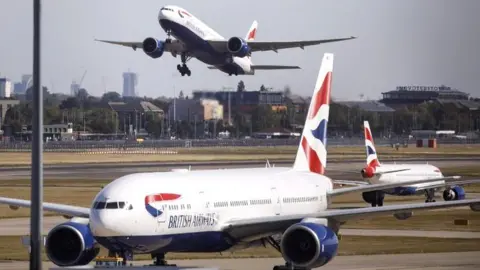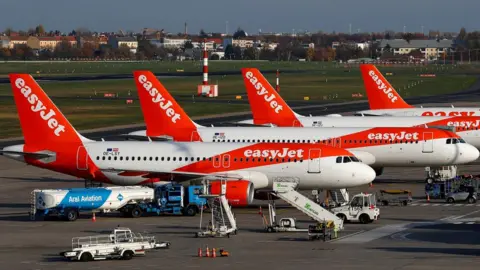IAG and EasyJet warn of coronavirus bookings hit
 AFP
AFPBritish Airways owner IAG has warned that bookings in 2020 will be hit by the effects of coronavirus.
IAG boss Willie Walsh said that as well as all China flights being suspended, there had been "a significant fall-off in demand in Italy".
Airline shares have fallen sharply amid investor concerns about the potential economic effects of the virus.
EasyJet is also cancelling some flights because of the virus and is looking into making cost cuts.
'Significant' fall
IAG said flight suspensions to China and cancellations on Italian routes would affect how many passengers it carried this year.
The airline group - which also owns Aer Lingus, Iberia and Vueling - said it was not possible to say how much profits would be hit in 2020 because of uncertainty about the impact and duration of the current outbreak.
IAG chief executive Willie Walsh told the BBC's Today programme that in the first three weeks of February, mainly Asian bookings had been affected.
"Clearly we had announced the suspension of flights to China. We took that decision at the end of January, and we had seen some impact on our other Asian routes, but it had looked like it was stabilising.
"But earlier this week we had the issues in Italy, and that's clearly led to a significant fall-off in demand in Italy and in some of the surrounding countries as well."
 PA Media
PA MediaMr Walsh added that business travel had been affected by the cancellation of large conferences, as well as by the introduction of travel restrictions by some big companies.
Shares in airlines have been among the hardest hit in the global market sell-off seen this week, and IAG's shares have sunk 17%.
"I don't think it's a surprise that investors are cautious in the current circumstances," Mr Walsh said, although he added that IAG had a "very strong balance sheet".


Of all the businesses affected by the coronavirus, airlines and travel companies are among the hardest hit.
It's a combination of factors. In some cases airlines have effectively been obliged to cancel services, because of warnings against all but essential travel issued by governments. Major international carriers have suspended normally busy routes to Chinese cities, for example.
On other routes, there are no such recommendations - but passenger numbers have dropped off because people are simply less willing to fly than usual. Some are staying at home for fear of contracting the virus; others are worried about being stranded abroad and forced into quarantine if they happen to come into contact with an infected person.
Tales of people being forced to spend weeks confined to cabins aboard cruise ships or barricaded inside hotels hardly make people want to go on holiday, while the cancellation of major industry events such as the Mobile World Congress in Barcelona and the Geneva Motor Show will have had a big impact on business travel.
IAG and EasyJet have joined other companies such as Air France-KLM, Lufthansa and Qantas in warning that this will cause them financial pain. Last week, the International Air Transport Association put the potential cost of the outbreak to the global industry at $29.3bn this year.
But that figure was based on the centre of the crisis remaining in China. It is now clear that the impact is being felt much more widely - so the costs could well be a lot higher.

Cost cutting
Budget carrier EasyJet said that following the increased number of coronavirus cases in Northern Italy, it had seen "a significant softening of demand and load factors into and out of our Northern Italian bases".
"As a result, we will be making decisions to cancel some flights, particularly those into and out of Italy."
EasyJet said it would also seek to cut costs. This will include looking into reducing administrative budgets, offering unpaid leave, and freezing recruitment, promotion and pay rises.
Finnair also joined the growing list of airlines issuing warnings, saying it expected a significant fall in operating profit this year due to lower demand for air travel.
 Reuters
ReutersRolls-Royce, one of the world's largest makers of aircraft engines, also warned of the impact of coronavirus on its business.
Chief executive Warren East said the virus was a "macro-risk for everyone".
"It's not sector specific, or company specific. It's a known unknown," he told the BBC.
"This is something that is developing daily, and the impact is going to depend on how long disruption lasts for, how wide, from a regional point of view, the disruption spreads, and of course for us as a business, our ability to mitigate against that."
